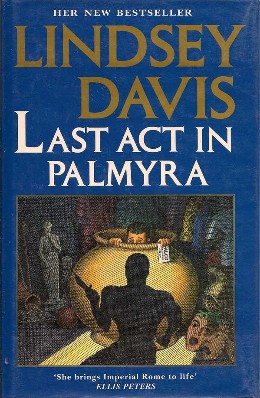Top Qs
Timeline
Chat
Perspective
Last Act in Palmyra
1994 novel by Lindsey Davis From Wikipedia, the free encyclopedia
Remove ads
Last Act in Palmyra is a 1994 historical mystery crime novel by Lindsey Davis and the sixth book of the Marcus Didius Falco Mysteries series. Set in Rome, Nabatea, and Palmyra, the novel stars Marcus Didius Falco, informer and imperial agent. The title refers to the hunt undertaken by Falco for a murderer, the last act of which takes place in Palmyra, as well as plays upon Falco's temporary employment as a playwright with a travelling theatre group.
This article needs additional citations for verification. (May 2009) |
Remove ads
Plot summary
In Last Act in Palmyra, Falco takes on a new spying mission for Vespasian to the east of the Empire. He also plans to investigate the disappearance of a young musician, Sophrona. Falco and Helena Justina travel to Petra, where they encounter a theatre group who have just lost their playwright due to drowning. Joining them, Falco attempts to fulfill his various investigations, whilst at the same time write his new play, The Spook Who Spoke.
Remove ads
Characters in "Last Act in Palmyra"
Main characters
- Anacrites — Imperial spy
- Helena Justina — Daughter of the Senator Decimus Camillus Verus
- Marcus Didius Falco — Informer and Imperial Agent from the Aventine.
- Musa — Priest from Dushara
- Sophrona — Musician, player of the water organ
- Thalia — Snake dancer
The theatre company
- Byrria — Actress
- Chremes — Actor-manager
- Congrio — Billposter
- Davos — Actor
- Grumio — Clown
- Philocrates — Actor
- Phrygia — Actress, wife of Chremes
- Tranio — Clown
The orchestra
- Afrania — Tibia-player
- Ione — Tambourinist
- Plancina — Panpipe girl
- Ribes — Lyre-player
Remove ads
Major themes
- Several investigations, including a spying mission for the emperor, a disappearing musician, and the murder of a travelling playwright.
- Developing relationship of Marcus Didius Falco and Helena Justina.
- The history and culture of the Roman Middle East (namely Arabia Petraea and Roman Syria).
Allusions/references to other works
- Members of the company make many references to New Comedy.
- As noted in the footnotes (p. 401 UK paperback edition), Falco's play, The Spook Who Spoke, bears more than a little resemblance to Hamlet by William Shakespeare.
- During the course of their journey, the travelling theatre company perform or refer to various plays, poems and playwrights. These include:
- Medea, The Trojan Women and The Bacchae by Euripides
- The Birds by Aristophanes
- Oedipus Rex by Sophocles
- The Girl from Andros and The Mother-in-Law by Terence
- The Rope, The Pot of Gold and Amphitryon by Plautus
- The Arbitration by Menander
- The Garland by Meleager
- Aeschylus
Remove ads
Allusions/references to actual history, geography and current science
Release details
- 1994, UK, Century Hardback (out of print)
- 1995, UK, Arrow, Paperback ISBN 0-09-983180-5
- 1995, UK, Magna, Large Print, ISBN 0-7505-0839-6
- 1996, US, Mysterious Press, Hardback (out of print)
- 1997, US, Mysterious Press, Paperback ISBN 0-446-40474-8
- 2003, UK, Arrow, Paperback ISBN 0-09-945199-9 (as part of single-volume omnibus edition, Falco on the Loose, with Time to Depart and A Dying Light in Corduba)
Remove ads
References
External links
Wikiwand - on
Seamless Wikipedia browsing. On steroids.
Remove ads

